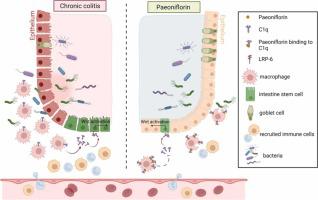Pharmacological Research ( IF 9.1 ) Pub Date : 2022-06-16 , DOI: 10.1016/j.phrs.2022.106309 Yirui Wang 1 , Keyuan You 1 , Yan You 1 , Qian Li 2 , Guize Feng 1 , Jiahui Ni 1 , Xinyue Cao 1 , Xiaowen Zhang 3 , Yanhang Wang 3 , Weilian Bao 1 , Xu Wang 1 , Tongqing Chen 1 , Haidong Li 1 , Yuran Huang 1 , Jiaren Lyu 1 , Shihang Yu 1 , Hong Li 1 , Suowen Xu 4 , Kewu Zeng 3 , Xiaoyan Shen 1

|
The pathological features of inflammatory bowel disease necessitate therapeutic strategies aimed at restoring intestinal mucosal barrier function in addition to controlling inflammation. Paeoniflorin, a bioactive herbal constituent isolated from the root of Paeonia albiflora Pall, has been reported to protect against acute colitis in mice. However, the direct molecular target of paeoniflorin in preventing colitis remains elusive. Here, we evaluated the therapeutical effects of Paeoniflorin using IL-10-/- chronic colitis model, and explored the precise mechanism of action involved. Our results demonstrated that intragastric administration of Paeoniflorin significantly ameliorated inflammatory response and restored the aberrant intestinal proliferation and differentiation in IL-10-/-colitis mice. By utilizing a chemical biology approach, we identified C1qa, a crucial component of C1q, is the direct target of Paeoniflorin. Binding of Paeoniflorin to C1qa prevented the cleavage of C1q on macrophages, resulting in the aggregation of surface membrane-anchored C1q and the diminished C1q secretion. The excessive surface membrane-anchored C1q significantly enhanced the phagocytic capability of macrophages and promoted the elimination of infiltrated bacteria and inflammatory cells in mouse colon. The reduced C1q secretion conferred by Paeoniflorin dampened Wnt/β-catenin signaling activation, thereby rectifying the aberrant proliferation and differentiation of intestinal stem cells (ISCs). In summary, our study demonstrates that Paeoniflorin can orchestrate mucosal healing and intestinal inflammation elimination through C1q-bridged macrophage-ISCs crosstalk, highlighting a novel strategy to treat chronic colitis by restoring mucosal homeostasis via targeting C1q.
中文翻译:

芍药苷通过控制慢性结肠炎巨噬细胞释放 C1q 来防止肠道干细胞的异常增殖和分化
炎症性肠病的病理特征需要治疗策略,除了控制炎症外,还需要恢复肠黏膜屏障功能。据报道,芍药苷是一种从白芍药根中分离出来的具有生物活性的草本成分,可预防小鼠急性结肠炎。然而,芍药苷预防结肠炎的直接分子靶点仍然难以捉摸。在这里,我们使用 IL-10 评估了芍药苷的治疗效果-/-慢性结肠炎模型,并探讨了所涉及的确切作用机制。我们的研究结果表明,芍药苷的灌胃显着改善了 IL-10 -/-结肠炎小鼠的炎症反应并恢复了异常的肠道增殖和分化。通过利用化学生物学方法,我们确定了 C1qa,它是 C1q 的重要组成部分,是芍药苷的直接靶点。芍药苷与 C1qa 的结合阻止了 C1q 在巨噬细胞上的裂解,导致表面膜锚定 C1q 的聚集和 C1q 分泌减少。过量的表面膜锚定 C1q 显着增强了巨噬细胞的吞噬能力,促进了小鼠结肠中浸润的细菌和炎症细胞的清除。芍药苷减少的 C1q 分泌抑制了 Wnt/β-连环蛋白信号的激活,从而纠正了肠干细胞 (ISC) 的异常增殖和分化。总之,我们的研究表明,芍药苷可以通过 C1q 桥接巨噬细胞-ISC 串扰来协调黏膜愈合和肠道炎症消除,

















































 京公网安备 11010802027423号
京公网安备 11010802027423号